A bachelor’s degree is simply not enough for most managers and leaders in today’s more competitive economic climate. Employers are looking for more education, experience, and solid credentials in the individuals that they hire. One way to attain such characteristics is to pursue a graduate degree. If you are in business or would like to start a business career, the ideal solution is to earn a Master’s of Business Administration (MBA). Attaining an MBA requires a significant amount of time, money, and commitment. For this reason, you mustn’t just choose any program for your MBA degree. You need to select an accredited program that is well regarded. Here is what to look for in MBA accreditation.
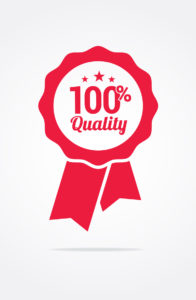
Basics of MBA Accreditation
Accreditation is a voluntary process by which colleges and universities show that they reach specific educational standards set up by a third party agency. The quality of the accreditation varies depending on how highly the accrediting agency is regarded by students, employers, and other educational institutions. The accreditation that students look for will be dependent on the type of program they want to pursue. When you choose a business school and an MBA program, there are a couple of accreditations to look for. The first thing you need to verify is whether or not the university is accredited. Second, you need to check for business accreditation by an agency that carries value in the field. This MBA accreditation not only speaks to the quality of the program but the better the MBA accreditation equals the better MBA brand.
Types of Accreditation
Accreditation adds a great deal of value to institutions that grant MBAs. A few of these benefits include an assurance of quality, a positive signal to employers, credibility, status, and influence at the international level. Therefore, the higher the accreditation, the more highly regarded the institution. Below are a few of the accreditations to note:
Regional Accreditations
In the U.S., the first thing to look for when researching MBA programs is if the college or university is regionally accredited. Regional accreditation is considerably more prestigious than national accreditation. This is predominantly because regional accreditation is typically for state and non-profit schools, while national accreditation is generally for for-profit and trade or vocational schools. Regional accreditations are given to universities that meet the region’s regional standards. Approximately 85% of colleges and universities in the U.S. are regionally accredited. Below are the six regional accrediting agencies:
- Middle States Commission on Higher Education includes Delaware, District of Columbia, Maryland, New Jersey, Pennsylvania, and New York
- New England Association of Schools and Colleges includes Connecticut, Maine, Massachusetts, New Hampshire, Rhode Island, and Vermont.
- Higher Learning Commission includes Arizona, Arkansas, Colorado, Illinois, Indiana, Iowa, Kansas, Michigan, Minnesota, Missouri, Nebraska, New Mexico, North Dakota, Ohio, Oklahoma, South Dakota, West Virginia, Wisconsin, and Wyoming
- Northwest Commission on Colleges and Universities includes Alaska, Idaho, Montana, Nevada, Oregon, Utah, and Washington
- Southern Association of Colleges and Schools includes Alabama, Florida, Georgia, Kentucky, Louisiana, Mississippi, North Carolina, South Carolina, Tennessee, Texas, and Virginia
- Western Association of Schools and Colleges includes California, Hawaii, and multiples islands and territories in the Pacific Basin
Business Accreditations
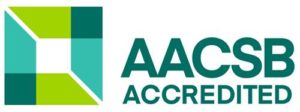
AACSB
The AACSB stands for the “Association to Advance Collegiate Schools of Business.” AACSB is widely considered the highest level of business accreditation and has been accrediting the top business schools around the world since before 1920. To become accredited by the AACSB, the school must reach and uphold standards in three areas: strategic management and innovation; learner success; and thought leadership, engagement, and societal impact. Top AACSB business schools include the W.P. Carey School of Business at Arizona State University and the Kelley School of Business at Indiana University.
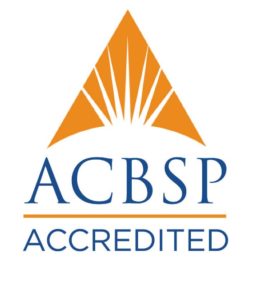
ACBSP
ACBSP accreditation is a highly regarded business accreditation and has been accrediting business programs, from associates through doctorates, since the 1980s. Instead of placing sole emphasis on research, the Accreditation Council for Business Schools and Programs (ACBSP) is focused on teaching excellence, student outcomes, and a commitment to improvement. Their core values and concepts include Continuous Improvement and Organizational Learning, Design Quality, Faculty and Staff Participation and Development, Fast Response, Leadership, Learning-Centered Education, Long-Range View, Management by Fact, Partnership Development, Public Responsibility and Citizenship, and Results Orientation. Top business schools with ACBSP accredited MBA programs include the College of Business at Embry-Riddle Aeronautical University and the Jack Welch Management Institute.

IACBE
IACBE accreditation is a mission-driven, outcomes-based business accreditation process. The International Accreditation Council for Business Education (IACBE) was founded in the late 1990s and today accredited over 2,000 business and accounting programs worldwide. They are intentionally set up to serve institutions of higher education to reach their own unique models, missions, and goals. Top business schools with IACBE accredited MBA programs include the Nathan M. Bisk College of Business at Florida Institute of Technology and the School of Arts, Science, and Business at Chatham University.
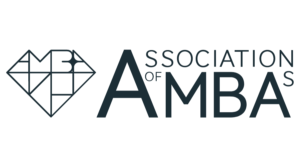
AMBA
The AMBA stands for “The Association of MBAs.” Schools that gain this accreditation are some of the most highly ranked business schools around the world. Schools are subjected to rigorous review criteria, which showcases the program’s value and helps the program realize shortcomings and fix them. In addition to this, the school must have a mission, have financial viability, have a discrete identity, be innovative, be well-founded, and have an excellent faculty. There are two U.S. business schools accredited by the AMBA: the Hult International Business School and the Olin Business School at Washington University in St. Louis.
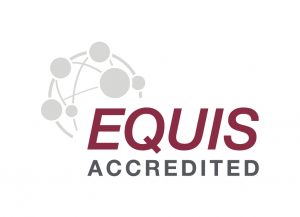
EQUIS
The European Quality Improvement System (EQUIS) is the institutional accrediting system of the European Foundation of Management Development (EFMD). It is an international education accreditation agency, and EQUIS concentrates on accrediting business and management educational institutions. EQUIS focuses on quality control and continuous improvement. They differ from other agencies because the agency standards are based on the quality of the business school, plus they also consider the school’s level of internationalization. There are three U.S. business schools accredited by EQUIS: the F.W. Olin Graduate School of Business at Babson College, the McCallum Graduate School of Business at Bentley University, and the Hult International Business School.
Whether you are searching for an MBA program on-campus or online, researching accreditations are always necessary. There are schools known as diploma mills, which offer little course work and effort from the student. While not too many years ago, online MBA programs could only receive national accreditations from the DEAC or ACICS. There are now prestigious online MBA programs holding top-notch business accreditation from regionally accredited schools and universities. Potential students should always inquire about accreditation to enrollment advisors before deciding on which educational institution is best.